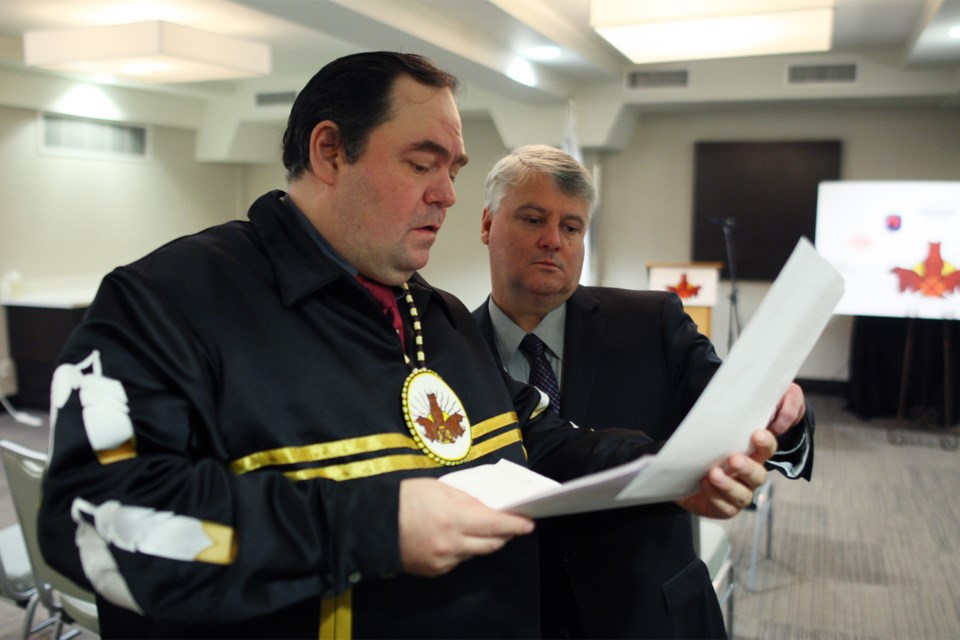The head of the working group seeking to restore passenger rail service between the Sault and Hearst says he didn’t expect his suggestion to involve Indigenous Affairs in funding talks would result in Transport Canada dropping the file entirely.
Chief Jason Gauthier, chief of the Missinabie Cree First Nation and head of the current working group, said he is disappointed by Transport Canada’s decision — announced earlier this week — to declare the Algoma Central Railway (ACR) ineligible for the Remote Passenger Rail Program subsidy.
“I don’t feel Transport Canada understands the line as we understand the line in terms of being a remote passenger train,” said Gauthier.
The Missinabie Cree hope to become the new operators for the service, which will be rebranded ‘Mask-wa Oo-ta-ban’ or ‘Bear Train’.
Gauthier acknowledged that Sheehan’s pre-election suggestion that the MP for Sault Ste. Marie should push back against Transport Canada’s removal of the subsidy is not being lived up to.
“I think he [Sheehan] should be held to task. I think he made a lot of commitments that he should be held to,” said Gauthier.
Three years ago, Transport Canada — then under the auspices of a Conservative government — made a similar decision to deem the service ineligible for the subsidy, a decision which was met with opposition by stakeholders, opposition and even the local Conservative MP at the time, Bryan Hayes.
During last fall’s election campaign, Sheehan questioned Hayes’ handling of the issue, suggesting the Conservative MP wasn’t doing enough to convince Transport Canada of the importance of the service.
In a September news release by Sheehan, he wrote:
"What action did Mr. Hayes take before the November decision to try and lobby for the people of Sault Ste. Marie and area and their rail service? What actions did he take to try and dissuade the government from cutting this subsidy?"
This week, Transport Canada, now run by the Liberal government, is making the same determination and denying the same subsidy, with the file being shifted to Indigenous and Northern Affairs Canada (INAC).
Sheehan said this change in ownership of the file aligns more closely to the Liberal government’s plans to improve nation-to-nation relationships with First Nations.
While the Conservatives were in power, an agreement was made in principle between Transport Canada and Railmark Canada, Inc. to offer three years of declining funding starting in 2015, with the service planned to be self-sufficient by the fourth year.
Sheehan said the Missinabie Cree proposal — presented to Transport Canada during a high-level meeting in Ottawa two weeks ago — sought a return of the original $2.2-million subsidy year-after-year, with no plan to become self-sufficient.
“It hasn’t operated in a year — it’s been worked on for two years. I am still committed to working with the group and continue to find some way to make this a viable business through creation of a viable business plan,” said Sheehan by phone.
Carol Hughes, MP for Algoma—Manitoulin—Kapuskasing, said the Liberal government is not taking the economy of northern Ontario seriously as the ACR file sat on Transport Minster Marc Garneau’s desk for months.
“I hate to say it, but at least with the Conservatives it appeared the funding was still sitting on the table. With the Liberals, they have basically been stringing people along up until now,” said Hughes.
Where Hayes pushed back against Transport Canada’s decision in an effort to bring back the subsidy, Hughes said Sheehan is now happy to go along with the ministry’s decision to transfer the file.
Gauthier said he would prefer to continue dealing with Transport Canada, although he welcomes assistance from INAC.
“I think there is a way to work together, but not place all of the responsibility on Indigenous Affairs,” said Gauthier.
It was Gauthier’s suggestion to bring INAC in on the conversation when Transport Canada officials expressed concern over where the funding would come from, but he did not expect the file to be transferred over entirely.
“I shouldn’t have been too surprised INAC would take on the full brunt of financially supporting the train,” said Gauthier.
Sheehan said Transport Canada will still be at the table, but will not be involved in providing a subsidy.
“Transport Canada would still be involved in their role of safety and regulation — they are the ones who provide the certificates,” said Sheehan.
